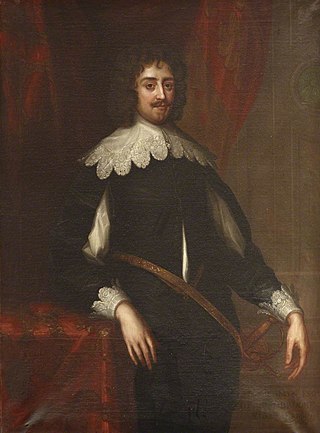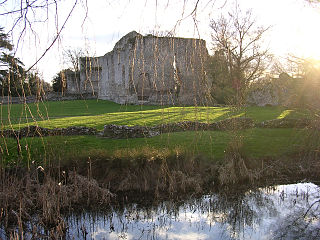Related Research Articles
Sir William Constable, 1st Baronet was an English soldier, politician and regicide, who supported the Parliamentary cause during the English Civil War and interregnum.
John Pyne was an English politician who sat in the House of Commons at various times between 1625 and 1653. He supported the Parliamentary cause during the English Civil War, but fell out with Oliver Cromwell during the Interregnum. At the Restoration he was exempted from the general pardon.

Sir Edward Hungerford (1596–1648) of Corsham, Wiltshire and of Farleigh Castle in Wiltshire, Member of Parliament, was a Parliamentarian commander during the English Civil War. He occupied and plundered Salisbury in 1643, and took Wardour and Farleigh castles.

Thomas Jermyn was an English courtier and politician who sat in the House of Commons for various seats between 1625 and 1644. He supported the Royalist cause in the English Civil War.

Sir John Stawell or Stowell, 29 August 1600 – 21 February 1662, was MP for Somerset at various times from 1625 to 1662, and one of the leading Royalists in the West Country during the First English Civil War.
Edward Kyrton, or Edward Kirton (1585–1654), was an English politician who sat in the House of Commons variously between 1624 and 1645. He supported the Royalist side in the English Civil War.
Christopher Lewknor was an English politician who sat in the House of Commons variously between 1628 and 1641. He supported the Royalist side in the English Civil War.
Sir Hugh Owen, 1st Baronet was a Welsh politician who sat in the House of Commons variously between 1626 and 1660. He sided originally with the Parliamentarian side in the English Civil War, but the strength of his allegiance was in doubt.
John Bodvel was a Welsh politician who sat in the House of Commons of England from 1640 to 1644. He was a colonel in the Royalist army in the English Civil War.
Thomas Glynn was a Welsh politician who sat in the House of Commons variously between 1624 and 1640. He supported the Parliamentary side in the English Civil War.

Sir John Strangways of Melbury House, Melbury Sampford, Somerset, and of Abbotsbury in Dorset, was an English politician who sat in the House of Commons variously between 1614 and 1666. He supported the Royalist side in the English Civil War.
Sir Edward Rodney was an English politician who sat in the House of Commons at various times between 1621 and 1642.

Richard Whitehead or Whithed was an English politician who sat in the House of Commons at various times between 1628 and 1653. He fought for the Parliamentary army in the English Civil War.
Sir Richard Lloyd was an English politician who sat in the House of Commons at various times between 1628 and 1676. He fought for the Royalist army in the English Civil War.

Thomas Coventry, 2nd Baron Coventry was an English politician who sat in the House of Commons between 1625 and 1629 and was subsequently a member of the House of Lords. He supported the Royalist cause in the English Civil War.

Sir John Hippisley was an English privateer and politician who sat in the House of Commons at various times between 1621 and 1653. He supported the Parliamentary cause in the English Civil War.
Lewis Watson, 1st Baron Rockingham was an English landowner and politician who sat in the House of Commons from 1621 to 1624. From 1621 to 1645 when he received his peerage he was known as Sir Lewis Watson, 1st Baronet. He supported the Royalist cause in the English Civil War and for his services was created Baron Rockingham in 1645.
Sir Henry Spiller was an English office-holder, landowner and politician who sat in the House of Commons between 1614 and 1629. He supported the Royalist cause in the English Civil War.
Sir Richard Spencer was an English nobleman, gentleman, knight, and politician who sat in the House of Commons from 1621 to 1629 and in 1661. He supported the Royalist cause in the English Civil War.
Edward Bridgeman was an English politician who sat in the House of Commons between 1625 and 1629.
References
- 1 2 3 4 History of Parliament Online article.
- ↑ W R Williams The Parliamentary History of the Principality of Wales
- ↑ Willis, Browne (1750). Notitia Parliamentaria, Part II: A Series or Lists of the Representatives in the several Parliaments held from the Reformation 1541, to the Restoration 1660 ... London. pp. 229–239.